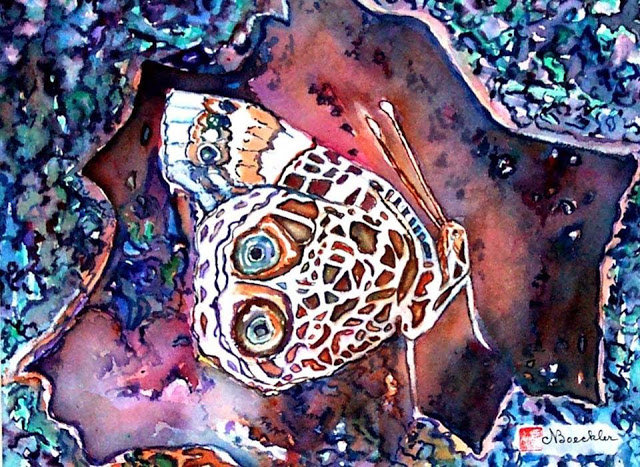| Image may be NSFW. Clik here to view.  |
| Henry Melchior Muhlenberg founded the Pennsylvania Ministerium, hence the General Synod wing of ELCA. His motto was Ecclesia Plantanda - The Church Must Be Planted. |
| Image may be NSFW. Clik here to view.  |
| His church - no praise band in the chancel. |
| Image may be NSFW. Clik here to view.  |
| The variety I planted was named Latana Bandana. |
Rescue plants from the clearance table at Walmart or Lowe's must be planted. Here are the steps I take:
- Late summer digging is difficult to impossible, so I soak the lawn with the sprinkler for an hour or two the day before.
- My experience with soaking bare-root roses in rainwater suggests the same is good for most potted plants. If they cannot be immersed in rainwater, then they can be rehydrated in the stored water of a kiddie pool - at least an hour.
- Mrs. Ichabod pointed out the Walmart kiddie pools being sold out in the $3.50 category. I said, "That is where I got my third one, great for soaking plants and mulch." She said, "You have three now?" Two are for the creatures, one is for gardening.
- I thought about a good place for the Lantana on the night I soaked the lawn. "They can grow in front of the rustic fence, between the two Elderberries." Then I fell asleep.
- Digging was quite easy - soft soil, earthworms, no tree roots.
- Each pot was quite root-bound, but the Lantana still looked fairly good, and insects were already drawn to it - either moths or small butterflies.
- After all of the Lantana were planted, I gave each one a long soak from the hose, which settles loose soil and gives the roots something to grow into.
- Mr. Gardener gave me more newspapers for mulching, so I soaked them in the kiddie pool overnight for the mulch layer. Wet newsprint is easy to use and resists blowing around.
- I want the lawn to turn into compost around the Lantana, so I will use wet newspapers and peat compost to form a blanket around the plants, over the soil.
The rustic fence, created from our dead tree remains, will make a good area for butterfly plants.
| Image may be NSFW. Clik here to view.  |
| The sunflower is a full service gas station, with lots of extra nectar (EFN) and pollen for our favorite insects. |
Achieving Balance for Beneficial Insects
Walliser supplies many good reasons for balancing the environment in favor of the beneficial bugs, which include insects and spiders. Birds and toads are also extremely useful for gardeners.
The good insects need pests to eat or to feed their young, so we should avoid all insecticides in favor of letting the design of Creation take over, the beneficial insects coming to the aid of wounded plants.
However, the beneficial bugs do not just feast on pests, so other food sources are necessary to reduce their commute from home base to the dinner table.
A constant supply of nectar and pollen--from flowers, weeds, and herbs--will provide food for insects not engaged in devouring pests or each other. Many of our favorite beneficial bugs are just as likely to dine on each other as they are to get rid of pests - yea even ladybugs and praying mantids. Those mantids look so pious as they fold their little green hands, but they begin life by devouring their siblings as they emerge from the egg case.
Here is a list to consider, to help the beneficial creatures do the work for us:
- Avoid all toxins, because they cause massive killing of good bugs along with a few bad ones.
- Keep a wild area where constantly blooming plants will supply nectar and pollen - pigweed, borage, goosefoot, comfrey, sunflowers, feverfew, buckwheat, goldenrod, etc.
- The wild area is also a good refuge for beetles, which love leaf litter as their base for nightly feeds.
- Autumn leaves on the ground will be a place where beneficial bugs overwinter or leave their young, so do not be so eager to bag or burn leaves. They are nurseries for next year's bug soldiers. So many people destroy the barracks where their hardest workers are being raised and trained to carry on the battle against pests.
- Leave shallow pans under or near water sources, so the toads have a place to hydrate. My baby toad population tells me I have a popular garden for their work.
- Plenty of water sources are good for the birds too, and that is their biggest need year around. I like kiddie pools for their baths and drinking, and I plan to heat one pool this winter. Don't judge me!
- Insects and birds like berries, so berry plants are going to nurture a lot of life. Sometimes the creatures share with us. If not, use nets over the plants.
- Stinging insects are all beneficial, and they seldom hurt humans. I actually got one sting this summer, not sure the source. It hurt a few minutes and itched a couple of days. I would never bring down a nest, as long as the insects are staying outside.
- Mud and manure are handy for birds and butterflies. Birds build with it and butterfly males need the sodium.
Where did the butterflies go? Where did the gardeners go!
Butterflies will show up where they have food, shelter, and an absence of insecticides. My neighbor sprayed for mosquitoes several times. That was a great way to get rid of all flying insects - except mosquitoes. They came back in force and my neighbor was out of pocket for the experiment.
| Image may be NSFW. Clik here to view.  |
| By Norma Boeckler |
